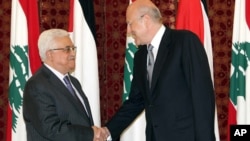RAMALLAH/GAZA —
Palestinian President Mahmoud Abbas praised Egypt's military on Thursday for toppling President Mohamed Morsi and his Muslim Brotherhood, the ideological ally of Abbas's Hamas rivals.
The fall of Morsi's government deprived Hamas of a sympathetic neighbor, and may strengthen Abbas's chances of nudging Hamas toward a long-delayed reconciliation and power-sharing pact.
By intervening to remove Morsi, the Egyptian army had prevented Egypt's “slide toward an unknown fate”, Abbas said.
Yasser Abed Rabbo, a top official in the Palestine Liberation Organization headed by Abbas, said: “This is a historic day for Egypt, and we are learning a lesson from the Egyptian example. Hamas should take note of what popular will can achieve.”
Palestinians are riven by political and cultural splits that mirror Egypt's. A Hamas victory in 2006 parliamentary polls led to a short civil war, which left the Islamists ruling Gaza, while Abbas's Fatah faction holds sway in the West Bank.
Hamas officials largely shunned the media on Thursday, and the movement took no position on the sudden removal of Morsi.
“We pray to God to preserve the security and the stability of Egypt and its people and to prevent bloodshed,” a Hamas spokesman, Ehab Ghussein, told Reuters.
The group had seen its star rise in the Arab world following a tide of uprisings in 2011 that swept religious-inspired governments to power in Tunisia and Egypt.
The leader of influential oil-rich Gulf state Qatar, a major backer of both the Brotherhood and Hamas, visited Gaza in October bearing hefty aid gifts. Egypt's prime minister, along with an Arab League delegation, came to the territory last November, even as Hamas and Israel fought an eight-day war.
Border crackdown
Hamas's muted response may signal its caution at upsetting an Egyptian military that controls Gaza border lifelines.
“It would be wrong to say relations won't be affected. Relations could become cold for a period,” said Hamas official Mustafa Assawaf, who stressed he was speaking as a political analyst about future ties with Egypt's new government.
Hamas leaders and supporters greeted Morsi's election last year with delight, believing his leadership would usher in the beginning of the end of an Israeli-Egyptian blockade on Gaza and a near-total international diplomatic quarantine.
But the Brotherhood, buffeted by Egypt's internal storms and exercising little authority over the security forces, furnished Hamas with few concrete advantages.
In recent weeks, Egypt's army, citing security concerns as it confronts Islamist militants in the Sinai desert, has stepped up a crackdown on border tunnels with Gaza through which food, fuel and weapons are smuggled.
The campaign has dismayed Hamas and pushed up prices in the impoverished coastal enclave.
Gaza residents say that dozens of Egyptian troops have reinforced the border areas since mass protests calling for Morsi's ouster began on June 30. The army also controls the Rafah border terminal, Gaza's main link to the outside world.
The fall of Morsi's government deprived Hamas of a sympathetic neighbor, and may strengthen Abbas's chances of nudging Hamas toward a long-delayed reconciliation and power-sharing pact.
By intervening to remove Morsi, the Egyptian army had prevented Egypt's “slide toward an unknown fate”, Abbas said.
Yasser Abed Rabbo, a top official in the Palestine Liberation Organization headed by Abbas, said: “This is a historic day for Egypt, and we are learning a lesson from the Egyptian example. Hamas should take note of what popular will can achieve.”
Palestinians are riven by political and cultural splits that mirror Egypt's. A Hamas victory in 2006 parliamentary polls led to a short civil war, which left the Islamists ruling Gaza, while Abbas's Fatah faction holds sway in the West Bank.
Hamas officials largely shunned the media on Thursday, and the movement took no position on the sudden removal of Morsi.
“We pray to God to preserve the security and the stability of Egypt and its people and to prevent bloodshed,” a Hamas spokesman, Ehab Ghussein, told Reuters.
The group had seen its star rise in the Arab world following a tide of uprisings in 2011 that swept religious-inspired governments to power in Tunisia and Egypt.
The leader of influential oil-rich Gulf state Qatar, a major backer of both the Brotherhood and Hamas, visited Gaza in October bearing hefty aid gifts. Egypt's prime minister, along with an Arab League delegation, came to the territory last November, even as Hamas and Israel fought an eight-day war.
Border crackdown
Hamas's muted response may signal its caution at upsetting an Egyptian military that controls Gaza border lifelines.
“It would be wrong to say relations won't be affected. Relations could become cold for a period,” said Hamas official Mustafa Assawaf, who stressed he was speaking as a political analyst about future ties with Egypt's new government.
Hamas leaders and supporters greeted Morsi's election last year with delight, believing his leadership would usher in the beginning of the end of an Israeli-Egyptian blockade on Gaza and a near-total international diplomatic quarantine.
But the Brotherhood, buffeted by Egypt's internal storms and exercising little authority over the security forces, furnished Hamas with few concrete advantages.
In recent weeks, Egypt's army, citing security concerns as it confronts Islamist militants in the Sinai desert, has stepped up a crackdown on border tunnels with Gaza through which food, fuel and weapons are smuggled.
The campaign has dismayed Hamas and pushed up prices in the impoverished coastal enclave.
Gaza residents say that dozens of Egyptian troops have reinforced the border areas since mass protests calling for Morsi's ouster began on June 30. The army also controls the Rafah border terminal, Gaza's main link to the outside world.

